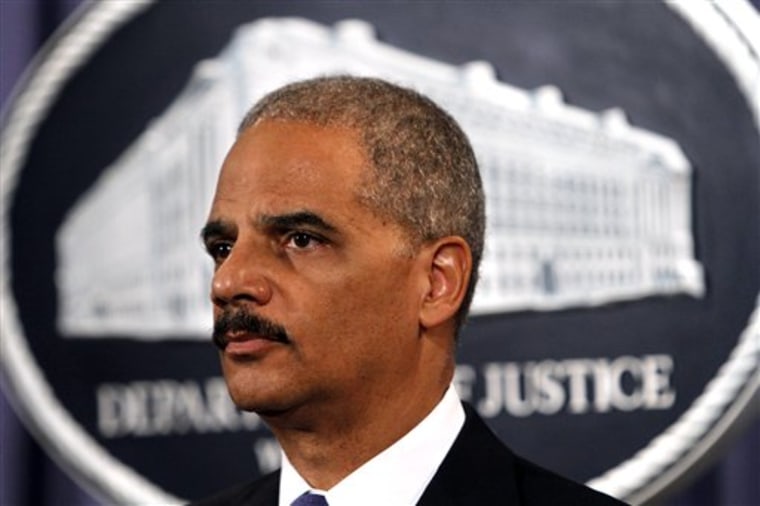Attorney General Eric Holder expressed regret Tuesday to the family of a slain federal border agent as the attorney general underwent pointed questioning by Senate Republicans about a flawed arms trafficking investigation called Operation Fast and Furious.
At a Senate Judiciary Committee hearing, Holder said that he can only imagine the pain that the family of border agent Brian Terry feels. The attorney general added, however, that it is not fair to assume that mistakes in Operation Fast and Furious led to Terry's death.
Two of the more than 2,000 guns whose purchases aroused the suspicion of Operation Fast and Furious investigators turned up at the scene of a shootout in Arizona that resulted in the death of Terry, a Customs and Border Protection agent.
Under questioning by the committee's ranking Republican, Sen. Charles Grassley, Holder also expressed regret that the Justice Department sent a misleading letter early this year to the senator rejecting allegations of serious problems in Fast and Furious. The criticism has focused on an investigative tactic known as "gun-walking," in which agents allow suspected illicit or "straw" gun buyers to purchase weapons so the guns can be traced to arms-trafficking ring leaders, who have long eluded prosecution.
The attorney general said that Fast and Furious never should have happened and "it must never happen again." He said that he wants to know why and how firearms that should have been under surveillance could wind up in the hands of Mexican drug cartels.
Holder's comments came as Grassley said the operation represented an "utter failure" by federal law enforcement officials to enforce existing gun laws.
Several ATF agents have testified to Congress that they were ordered by superiors to let suspected straw buyers walk away from Phoenix-area gun shops with AK-47s and other weapons believed headed for Mexican drug cartels, rather than arrest the buyers and seize the guns there.
Grassley asked who the attorney general "plans to hold accountable" for the arms trafficking probe.
In August, the Justice Department replaced three officials who played critical roles in the arms trafficking probe — the acting director of the Bureau of Alcohol, Tobacco, Firearms and Explosives, the U.S. attorney in Arizona and a prosecutor who worked on the arms trafficking probe. The department's inspector general is still investigating the case, at Holder's request.
Grassley pointed to a Justice Department letter the senator received last February saying that federal agents make "every effort" to intercept weapons that have been purchased illegally and prevent their transportation to Mexico.
Holder said that the letter was based on incorrect information and that "I regret that." The attorney general said the incorrect information was supplied by the U.S. Attorney's office in Phoenix and ATF officials.
Holder said he first heard allegations of problems in Fast and Furious early this year, prompting Sen. John Cornyn, R-Texas, to ask whether it was Holder's responsibility to have known.
"I have ultimate responsibility, but I cannot be expected to know" the details of day-to-day operations, the attorney general replied.
The Associated Press has reported that the investigation of Fast and Furious has turned up Justice Department documents which indicate the gun-walking tactic was used in two other investigations by ATF offices in Arizona during the George W. Bush administration and a briefing memo to Bush's Attorney General Michael Mukasey that briefly described use of the tactic.
Regarding the fallout from Fast and Furious, Holder said that "unfortunately, we will feel its effects for years to come as guns that were lost during this operation continue to show up at crime scenes both here and in Mexico."
ATF lost track of some 1,400 of the more than 2,000 weapons whose purchases attracted the suspicion of the Fast and Furious investigators.
Holder also may be questioned by Democrats on the panel over new FBI rules on intelligence collection activities, an issue of importance to civil liberties groups concerned that in a post-Sept. 11 world, the government is loosening restrictions on investigative tactics.
In the years since 9/11, Congress and the Justice Department have granted the FBI "ever-greater powers to investigate Americans with less basis for suspicion and less oversight," said Elizabeth Goitein, co-director of the Liberty and National Security Program at the Brennan Center for Justice.
Holder, who says he learned of problems in Fast and Furious early this year, has become a focal point for criticism in an investigation by the House Oversight and Government Reform Committee chaired by Rep. Darrell Issa, R-Calif. Republican critics have suggested Holder was informed of the problems as early as July 2010 when the operation's name turned up repeatedly in weekly departmental reports. The reports provided updates on dozens of investigations, including Fast and Furious, but do not mention the gun-walking tactic.
The attorney general cited congressional testimony by some of the ATF agents in the probe who said they lack effective enforcement tools. They have sought clearer legal authority to arrest straw purchasers and tougher prison sentences for them. Holder asked Congress to "fully fund our request for teams of agents to fight gun trafficking."
On Monday, the committee's chairman, Sen. Patrick Leahy, D-Vt., asked whether the Justice Department's inspector general has expanded its probe of Operation Fast and Furious to include earlier Bush-era arms trafficking probes that relied on gun-walking.
The IG's office says in a semiannual report that it is reviewing Operation Fast and Furious "and other investigations with similar objectives, methods and strategies." A spokesman for the IG's office, Jay Lerner, declined to comment on whether the investigation has been expanded to cover Wide Receiver and the probe that the briefing paper to Mukasey referenced.
